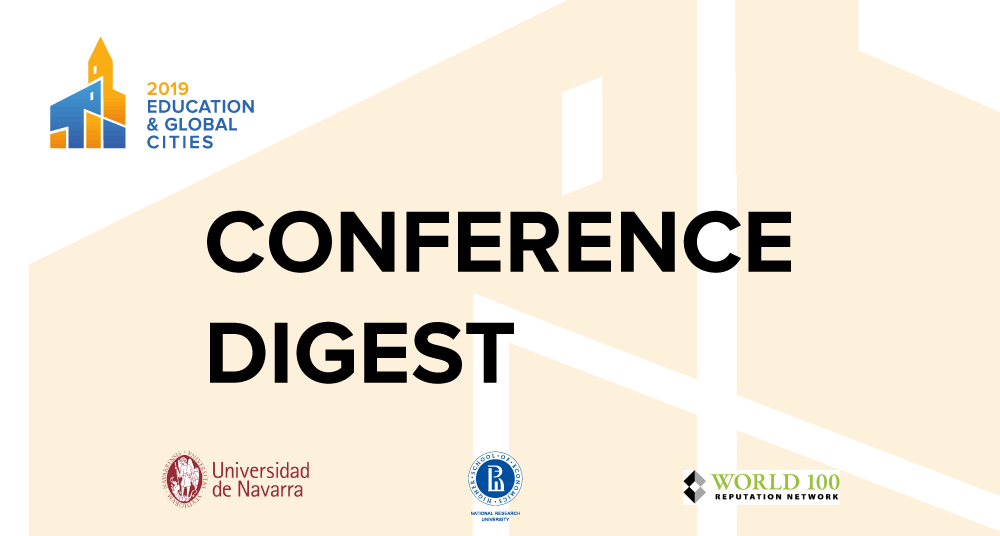Education and World Cities 2019. A Detailed Digest of the Conference
The Sixth International Conference ‘Education and World Cities 2019: New Horizons of University Reputation’ begins tomorrow. We offer you a description of the two-day long event, and invite you to join the online broadcast of the conference.

The conference will be broadcast live on Facebook. The working language is English.
Day 1
International Education: New Approaches to the University Partnership
Representatives of partner universities and educational agencies from fifteen countries along with participants of the international conference ‘Education and World Cities’ will meet at the plenary session to discuss recent approaches and trends in international university cooperation. The growing role of educational associations, consortia and networks in the development of international education will be the key topic of the discussion. Participants will be able to get to know the best practices of combining efforts and resources toward solving problems and developing the world’s market of educational services.
Learn more about the plenary session.
Multiple Education Models for the Labour Market Transformations
Universities have been seeking to be competitive in the global market of educational services are developing and implementing new education models. Double degree programmes, bilingual programs, personalised learning tracks may serve as examples of such changes. At the plenary discussion, experts will present their experiences with transforming the educational landscape in accordance with the new needs of the labour market.
Creating Personalised Learning Systems
Universities have been looking for new ways to customise course content and educational technology, and to tailor academic and career support to the needs of students in both group and individual contexts, their learning styles and their career aspirations.
Personalised learning should involve, at the very least, an individualised academic trajectory developed in collaboration with a mentor. Moreover, students themselves set the pace—upon completing an educational module, they can think about where and how to put the knowledge and skills they have gained into practice, or engage in hands-on work for a while. Then, when there is a need for new knowledge, they can return to their studies.
Learn more about the plenary discussion.
University Ambassadors (Alumni and Students) Abroad—Their Role in the Reputation of Their Alma Mater
Competition in the field of international education is growing year by year. It is getting more and more challenging for universities to find their place in the sun and to be competitive—that is why we need effective promotional tools.
Student ambassador programmes are actually an effective tool for promotion which benefits all parties involved. First of all, the benefit of these projects for students in particular is that they develop cross-cultural communication skills, presentation skills, promotion in social network. Universities in turn gain the opportunity to increase their internationalization, improve their reputations and promote their brands, expand scientific and educational cooperation with leading academic and research institutions, and attract talented young people for training and research.
Read the interview with Olga Krylova about HSE SPb student ambassadors programme.
Day 2
Reputation Beyond Rankings
The foundations of a good reputation lie in the quality of a university's education and research, as well as its contributions to society and sense of social responsibility. Universities should strive not to lose focus of its primary mission—providing high quality teaching and an excellent student experience. A challenge universities face is understanding that the condition of its reputation includes ‘tangibles’ as well as ‘intangible assets’ in the management of a university, and those ‘intangibles’ include university quality, relationships, transparency, work environment, student experience, and the understanding of the different ‘stakeholders’ of the institution.
Read the interview with Magdalena Gaete about university reputation.
Building Reputation as Part of Your University’s Strategy
For the last ten years or more, we’ve also had rankings, creating identikit aspirations to rank among the world’s top 100 universities or higher. But universities are looking more and more the same, rather than different. Copying one another’s behaviour rather than going their own ways. One only has to take a look at any university website to know that a lot of what is said is pretty similar. However, investing in distinctiveness is one way that we could gain real competitive advantage.
Lean more about the keynote speech.
Distinctiveness – Reputation as a Global Tool
In accordance with the methodology of modern institutional rankings, multidisciplinary universities take higher positions. There are a lot of specialised universities that have a prominent industry specificity in the post-Soviet countries. Despite the fact that these universities have a huge reputation potential, it turns out that they universities are usually underrepresented in international rankings. At the plenary discussion, experts will analyse such cases from around the world.
Accreditation and Reputation: Success Stories from Russia
International accreditations have become a key marker that attests to the quality of teaching and the sustainable development of universities and business schools. Students of accredited programmes can be sure that they will gain skills that are in demand on the international market right now. This also makes it possible to successfully implement programmes aimed at developing human resources in terms of teaching staff, as well as administrators, that meet missions and strategic goals of schools and universities. The quality of teaching, recognised by the international professional community, makes a great contribution to a university's reputation that is why accreditations should become a tool for strategic development of universities. Having international accreditations encourages strategic partnerships with leading universities and international companies that are interested in hiring graduates with both professional skills and soft skills to perform priority tasks.
Read the interview with Olga Okulova about international accreditations.
The detailed programme of the conference is available through the link.

